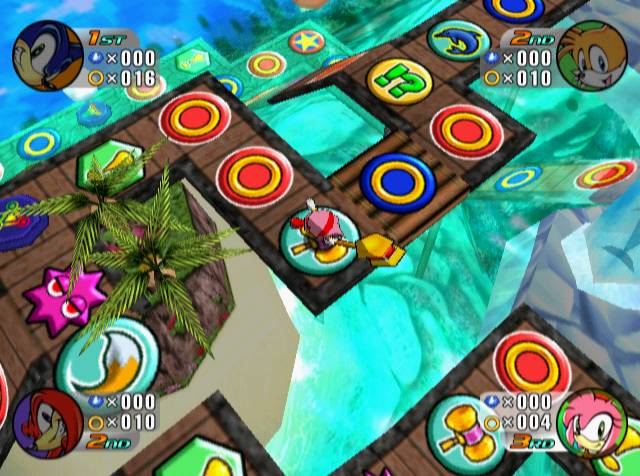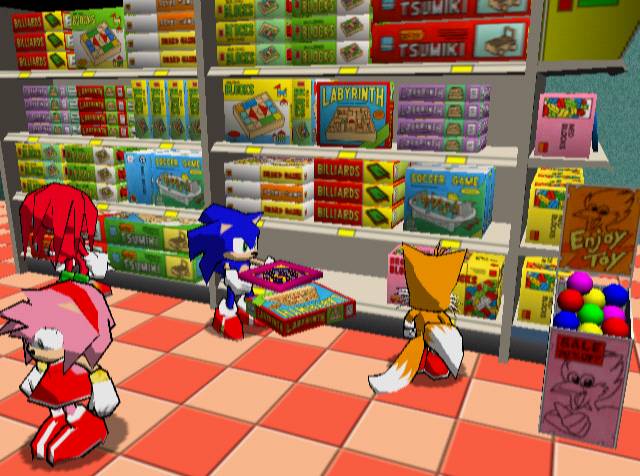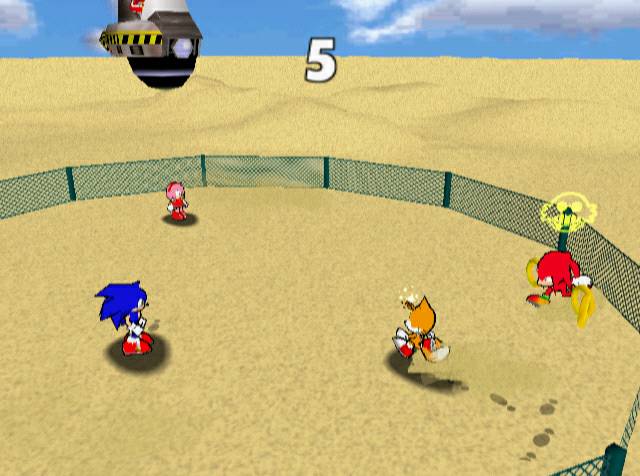Sonic Shuffle
Review - party games are becoming a genre unto themselves, but can Sonic's influence put Shuffle above the rest?

P-A-R-T, but Why?
As with most of Sonic's games, Shuffle is a direct competitor to a Mario title. You can trace it right back to when the first home consoles were kicking about. From Marioland on the GameBoy to Mario 64, a Sonic game has never been far behind. Mario Party is Sonic Shuffle's inspiration, and unfortunately for the sprightly blue hedgehog, this one hasn't worked out quite so well. With Mario Party, Nintendo created an eclectic board game, but in the form of a cartridge rather than a lot of counters and dice, which meant less faffing around drunk and knocking over the carefully arranged piles of counters, and more button bashing and general rowdiness. Sonic Shuffle has the looks - it uses the enchanting cell-shading technique put to use by Jet Set Radio - but thanks to the atrocious load times and overly complex instructions it will appeal to very few, and certainly fails to hit the target so clearly defined by Nintendo. Oh, and it's boring. The audio and visuals are deceptively good, but did a good job initially of hiding the hideous gaps in the gameplay. The characters are all well defined thanks to the cell-shading technique, and the actual game board is nicely textured and brightly coloured. Everything looks very much like a cartoon, with smooth 60 frames per second animations, and it's all accompanied by cheerful little musical numbers. Each of the characters has sufficient voice acting to back them up, and overall the game is just… pleasant to be around.

Illusion
As I said though, the audio and visuals are deceptively good. You first realise just how annoying Sonic Shuffle really is when you land on a "special tile" and it starts to load a mini-game. It takes a bloody age. Every departure from the main game board precipitates a long pause while data is fetched from the GD-Rom. Getting back to the board is equally tiresome. Within the game, each character has a hand of cards with a number on them. You choose a card and it determines how many tiles you move across the board. If your cards are all a bit rubbish, you can take a chance on another player's card, although it's impossible to know what value will be on it. After all the cards are dispensed with, another round is handed out randomly. Trouble is, the game isn't anywhere near as exciting as Mario. There are some special tiles for the sub-games and such, but most of the tiles on the board are blue or red, which add or subtract three of your character's rings respectively. Rings? Yes, er, they function very much like coins do in Mario. The big issue here of course is that with the board being so low on special tiles, it's incredibly rare for you to get to play a mini-game against another player, which was of course what made Mario Party so spectacular. Presumably limiting the amount of mini-games was Sega's attempt to mask the hideous load times.

Conclusion
The actual aim of the game is to collect the "Precioustones", which are powerful gemstones scattered around the board. But who cares, eh? Party games should be about manic mini-games that you can shout and scream about with your friends. The first problem is that the mini-games in Shuffle are usually too complex, meaning you actually have to read the damned instructions. Like "Chef's Love Shack", another party title for the Dreamcast, the game is marred by the amount of time it takes to load everything, and the difficulty of the games themselves. With Love Shack, you rarely got anywhere, but at least it wasn't that hard to get the hang of things. With Shuffle, you spend most of the time trying to work out what's going on, because after waiting so long for things to load, the last thing you can be bothered with is reading instructions. When all's said and done, Sega should have sat down and looked at Mario Party, and tried to work out what made it so popular. Board games aren't really party games, are they? It's the mini-games and variety of tasks on hand that build up the party atmosphere, and that's where Sonic Shuffle falls down. It's just not worth persevering with, and Mario Party (and its sequel) stomp all over it. If you're looking for a good console come board game, buy an N64, at the moment, the only alternative likely to get your friends moving on Dreamcast is Samba De Amigo.








